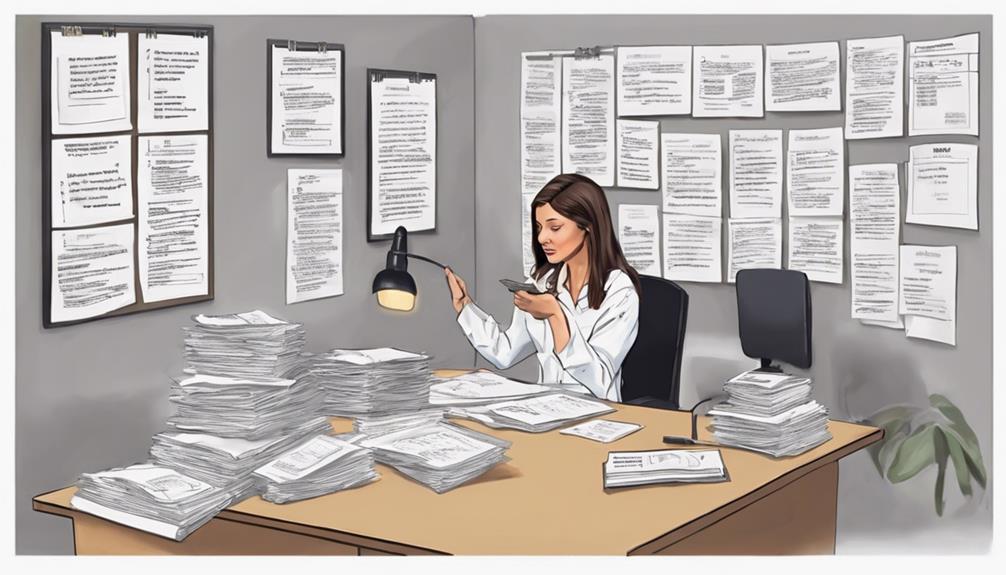Did you know that close to **half** of marriages in the United States result in divorce? Discover more about this eye-opening statistic and why it’s essential to understand the factors contributing to marital dissolution. Keep reading to uncover the truth behind marriage success and failures.
Facing a divorce pretrial can be overwhelming, but with the right guidance, you can navigate this challenging process with confidence and clarity. Understanding the crucial steps involved in preparing for your divorce pretrial can significantly impact the outcome of your case.
From gathering essential documents to strategizing your trial approach, each stage plays a vital role in securing your future post-divorce.
Stay tuned to discover key insights and actionable steps to help you navigate your divorce pretrial effectively.
Key Takeaways
- Collect and organize financial and legal documents meticulously for efficiency.
- Maintain clear communication and collaboration with your legal team for a strong case.
- Understand pretrial procedures like depositions and conferences for preparation.
- Gather and prepare evidence with your attorney, strategizing for a compelling presentation.
Gathering Required Documents
When preparing for your divorce pretrial, start by gathering all the necessary documents to provide a comprehensive overview of your financial situation. Begin by collecting essential financial documents such as tax returns, bank statements, investment accounts, and property deeds. These papers will help outline your income, expenses, debts, assets, and liabilities, painting a clear picture for the court and your attorney. Additionally, gather legal documents like prenuptial agreements, marriage certificates, and any existing court orders to ensure you have a complete set of information.
It is crucial to organize these documents meticulously, ensuring they're up to date and accurate. Having all the necessary paperwork ready will save time and streamline the legal process during your divorce pretrial. Remember to keep copies of these documents for yourself, your attorney, and for presentation in court. Being well-prepared with your financial and legal paperwork demonstrates diligence and readiness for the proceedings ahead.
Communication With Legal Team

As you prepare for your divorce pretrial, establishing clear and open communication with your legal team is essential for building a strong case strategy. Communication is key to ensuring that your legal team is well-informed and equipped with all the necessary information to represent you effectively. Be proactive in providing relevant documents, such as financial records or communication with your spouse, as these can significantly strengthen your case.
Discuss your goals and priorities with your legal team to align strategies and approaches for the pretrial process. By sharing your objectives, your legal team can tailor their efforts to meet your specific needs. Stay responsive to your legal team's communications and requests for information to facilitate a smooth pretrial preparation. Timely responses can help expedite the process and keep things on track.
If you have any doubts or need clarification on legal terms or procedures, don't hesitate to seek guidance from your legal team. Understanding the details of your case can boost your confidence and ensure you're well-prepared for the pretrial phase.
Understanding Pretrial Procedures
To navigate through the complexities of the divorce pretrial phase, familiarize yourself with the essential procedures involved in preparing for the upcoming trial.
- Legal Documents: Begin by organizing all necessary legal documents, including financial affidavits and asset disclosures, to ensure compliance with court requirements.
- Depositions: Be prepared for depositions, where sworn testimonies from witnesses and involved parties are gathered to establish facts for the divorce trial.
- Pretrial Conferences: Attend pretrial conferences with the judge to address scheduling, settlement negotiations, and procedural matters crucial for the upcoming trial.
- Evidence Preparation: Use the pretrial phase to meticulously gather and organize evidence that supports your case, setting the foundation for a strong presentation during the divorce trial.
Understanding these pretrial procedures is vital as they lay the groundwork for a successful divorce trial. Make sure to engage actively in these processes to ensure you're fully prepared for the legal proceedings ahead.
Preparing Evidence and Testimonies

Navigating the divorce pretrial phase successfully requires thorough preparation of evidence and testimonies to support your case effectively. To ensure you are well-equipped for this crucial phase, gather all relevant documents such as financial records, communication logs, and any agreements pertinent to the divorce process. Additionally, create a list of potential witnesses who can provide valuable testimony in support of your claims. Organize your evidence meticulously in a clear and concise manner to construct a compelling argument in court. Practice delivering your testimony with your divorce attorney to guarantee clarity and confidence during the pretrial proceedings. Collaborate closely with your lawyer to strategize on the best presentation of your evidence and testimonies for a favorable outcome. The table below summarizes key elements to consider when preparing evidence and testimonies for your divorce pretrial:
| Aspect | Importance | Action Required |
|---|---|---|
| Financial Records | Vital for Division of Assets | Gather all financial documents and records. |
| Communication Logs | Essential for Evidence | Compile all relevant communication logs. |
| Witness List | Support Testimonies | Identify potential witnesses and their testimonies. |
| Practice Testimony | Ensures Clarity | Rehearse delivering your testimony effectively. |
| Strategy with Attorney | Maximizes Impact | Collaborate with your attorney for the best presentation. |
Developing Trial Strategy
In developing your trial strategy for your divorce case, it's crucial to thoroughly understand the legal issues at hand and clearly define your desired outcomes. To ensure a successful outcome, consider the following steps:
- Assess Your Case: Evaluate the strengths and weaknesses of your case to determine the most effective approach for presenting evidence.
- Collaborate with Your Attorney: Work closely with your attorney to gather relevant documents, identify key witnesses, and secure expert testimonies that support your position.
- Anticipate Opposing Arguments: Foresee potential arguments from the opposing party and prepare counterarguments to strengthen your case.
- Adhere to Court Rules: Tailor your trial strategy to align with the specific court rules and procedures governing your case, increasing your chances of a favorable outcome.
Frequently Asked Questions
What Is an Entry Hearing in Texas?
An entry hearing in Texas marks the start of your divorce process. It outlines timelines, deadlines, and financial disclosures. The judge may issue temporary orders on child custody, support, and property. It's a crucial step setting the stage for proceedings.
What Steps Should I Take to Prepare for a Divorce Pretrial?
To prepare for a divorce pretrial, follow a stepbystep divorce preparation guide. Gather financial documents, organize evidence, and consult with your attorney. Understand the court’s procedures and prepare a strong case. Take care of your emotional well-being and seek support as you navigate this challenging process.
Conclusion
As you approach your divorce pretrial, remember that like a puzzle, each piece fits together to create the bigger picture.
By gathering the necessary documents, communicating effectively with your legal team, understanding procedures, preparing evidence, and developing a strategic plan, you're laying the foundation for a successful outcome.
Stay focused, stay strong, and trust that you're taking the necessary steps towards a new chapter in your life.
You've got this.










